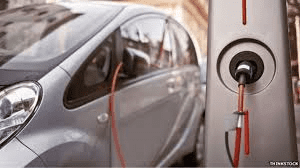Rising fuel costs are making businesses with company cars seriously consider switching to EV (86%)
· A quarter of businesses with a fleet have already switched some – if not all – of their cars to EV or hybrid models
· Even factoring in higher average leasing and insurance prices for EVs, many could save £460+ per year on day to day running costs
· The main barrier to switching has been concern about access to charging points (31%)
· Over half (53%) of employees have access to one or more EV charge points at their workplace
· Based on average mileage, a single charge point could service 16 employees per week
· Further information on the study can be found here: https://www.icompario.com/en-gb/guides/great-ev-switchover/
Rising fuel costs are making most businesses with company cars (86%) seriously consider switching to EVs and hybrid models, new research from the experts at iCompario has revealed, and there are some significant savings to be made for those that do.
The study found that a quarter (24%) of businesses with a fleet have already switched some – if not all – of their vehicles to EV (BEV) or hybrid models (PHEV), and its directors and Chief Officers who are most inclined to swap to ultra-low emission vehicles.
The biggest savings are in fuel costs
Based on average mileage and current fuel and energy prices it has been estimated that businesses could save as much as £904 per year on fuel costs if they swapped a single petrol vehicle in their fleet for an EV. Switching from a diesel model could save £775 per year.
Overall, using a rapid charge point costs around 7.4p per mile, and a slower at home / workplace charger is around 7.6p per mile.
| Type of charging | Full charge cost | Cost per mile |
| Home | £15.12 | £0.076 |
| Rapid Charging points | £13 | £0.074 |
In contrast, current fuel prices mean that a single mile travelled in an (unleaded) petrol vehicle costs around 20p and it’s around 19p per mile for vehicles run on diesel.
| Fuel Type | Full cost | Cost Per Mile | Fuel savings going electric per mile | Fuel savings per 200 miles going electric | Fuel Savings per year going electric |
| Unleaded | £41.82 | £0.209 | £0.134 | £26.70 | £904 |
| Diesel | £37.96 | £0.190 | £0.114 | £22.84 | £775.20 |
But what about other day-to-day running costs?
Insurance costs for EVs can work out higher, with the average premium coming in at £67 more for EVs than for petrol or diesel vehicles (£619 versus £552).
However, there are some low emissions models such as the Volkswagen ID that are nearly £200 cheaper to ensure per year than the average car (£380 versus £552).
Leasing costs may also be more per vehicle, with a comparison of similar petrol/diesel and EV models revealing that low-emission options can work out at around £566 more per year to lease.
That said, leasing the Mini Electric (over the standard petrol Mini 3rd Hatch Cooper) and the Nissan Leaf 40 (over the similar petrol Ford Focus 1.0) could lead to savings of between £30-£45 a month or £360+ per year for each vehicle.
| Electric Car Running Costs versus Petrol / Diesel Models | £s Difference (Per Year) | |||
| Fuel savings (Petrol – Average mileage) | £904 | |||
| Leasing (EV v comparable Petrol / Diesel models) | -£679 | |||
| Insurance (EV average v Petrol / Diesel average) | -£67 | |||
| Road Tax (Standard annual – Petrol / Diesel average) | £305 | |||
| £463 saving | ||||
Barriers to switching remain
Of those businesses with fleets, three in ten (31%) said one thing that’s put them off so far is concerns about access to charging points.
These may be unfounded though, as over half (53%) of those surveyed reported that they have access to one or more EV charge point at their workplace already.
Analysis indicates that to provide employees with enough ‘power’ each week for all their weekly mileage, a single standard charge point (7-22kWh) could service around 16 employees.
Furthermore, the government’s Workplace Charging Scheme is incentivising the instalment of these by helping cover some of the cost – up to 75% of the charge point installation and £250 per socket, for up to 40 sockets.
Kerry Fawcett, Digital Director at iCompario said: “It’s clear that the current high fuel prices are altering perceptions and timescales when it comes to moving to ULEV models.
While fuel cards can help secure lower petrol and diesel prices ‘at the pumps’, and ease with admin too, it’s clear that further cost savings can be made if businesses are open to switching to EV and hybrid vehicles.
We estimate that it could work out as much as £900 cheaper to ‘fuel’ an EV per year and depending on which models you go for there are also savings to be made in insurance and leasing costs too.
Many ULEVs are exempt from road tax too (which is around £154 per year on average), while those travelling through central London can save £15 per day on the congestion charge.
Overall, we estimated that on a per-vehicle basis, you could see a fairly conservative saving of £460+ per year.
Furthermore, employees using the ‘Benefit in Kind’ scheme can profit from the lower tax rates which are locked in until 2025. We estimate that this averages out at around a tax saving of £2,100+ per year, although again this will vary from person to person.
Our vehicle hire, insurance and fuel card experts can help businesses determine what could be the best fit for them, according to their needs. With so many cost increases at this time, it’s certainly worth exploring if savings could be made.”
For further information, please visit: https://www.icompario.com/en-gb/guides/great-ev-switchover/

| [donate]
| Help keep news FREE for our readersSupporting your local community newspaper/online news outlet is crucial now more than ever. If you believe in independent journalism,then consider making a valuable contribution by making a one-time or monthly donation. We operate in rural areas where providing unbiased news can be challenging. |

















